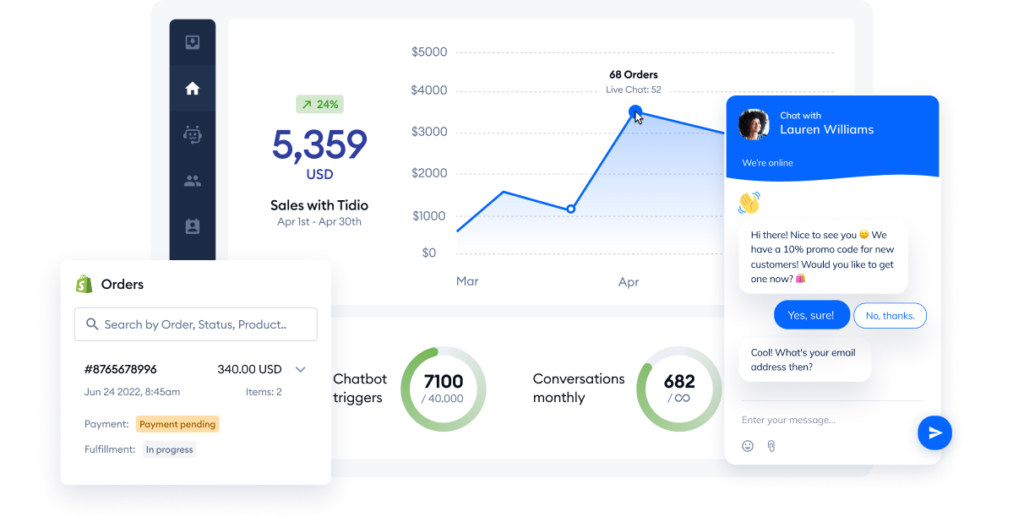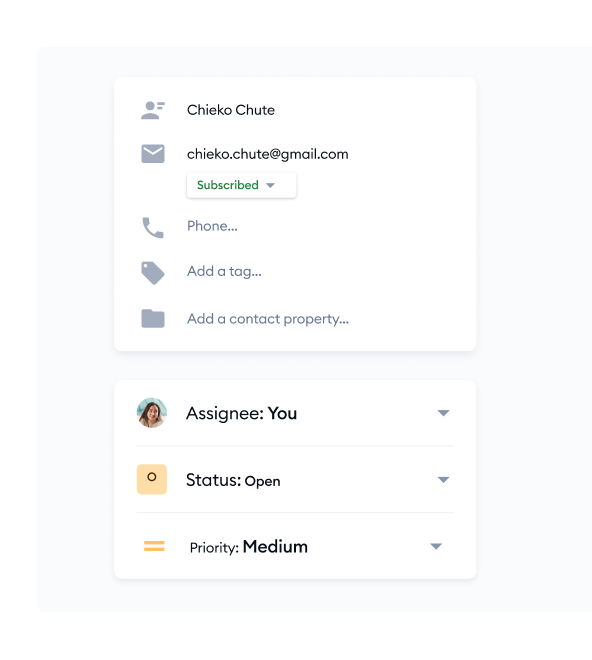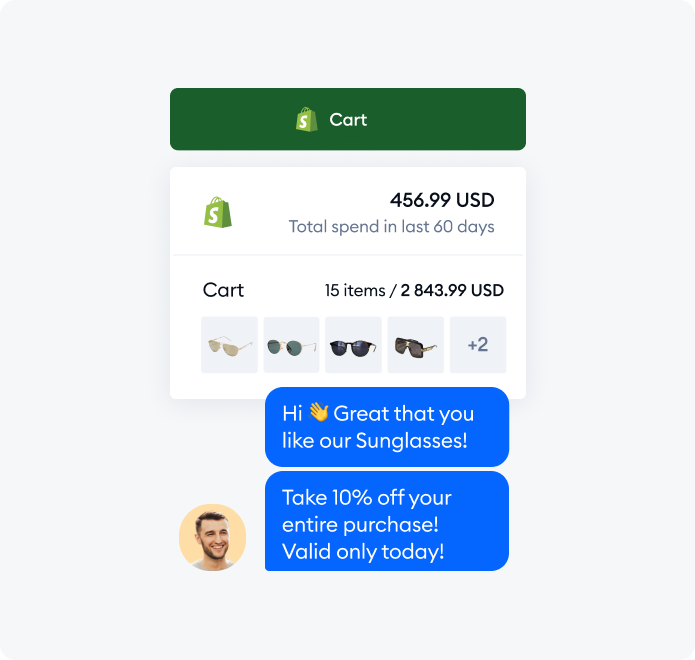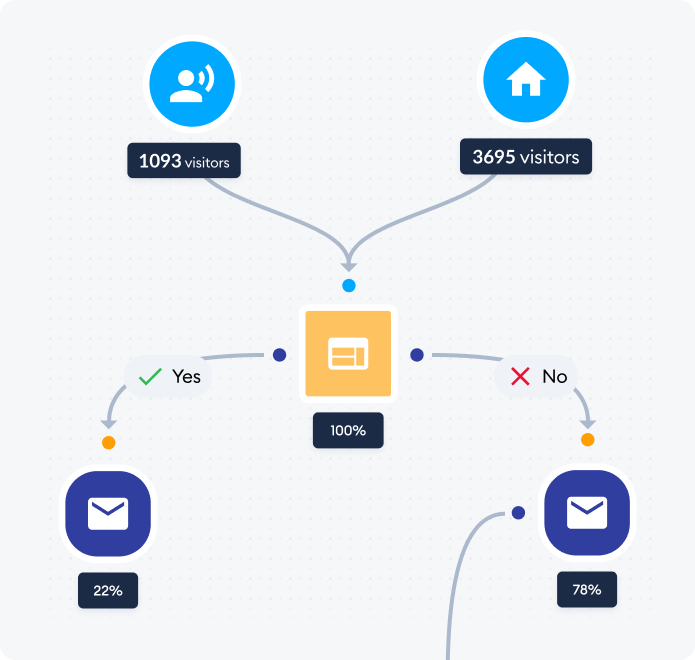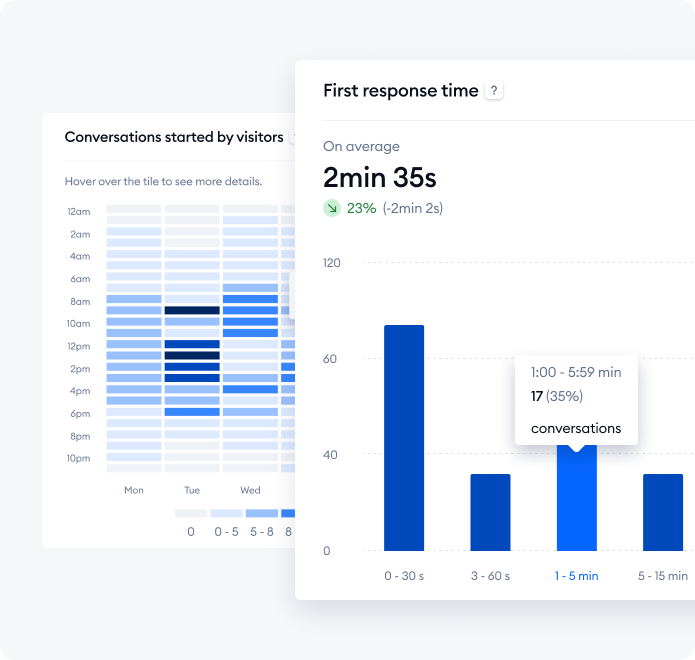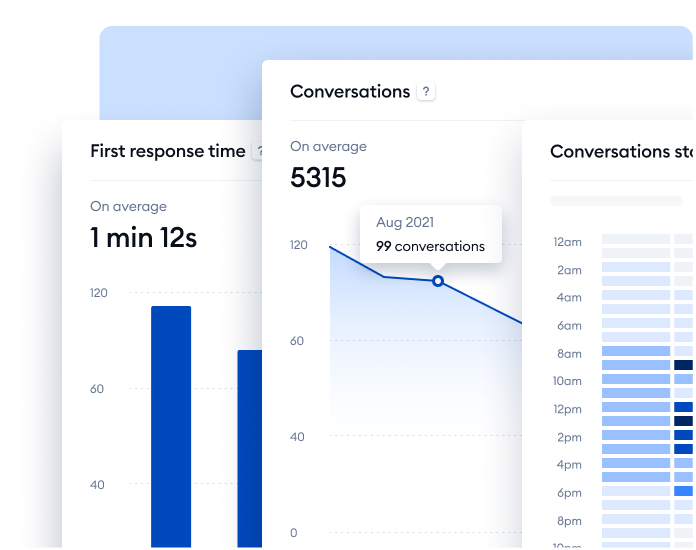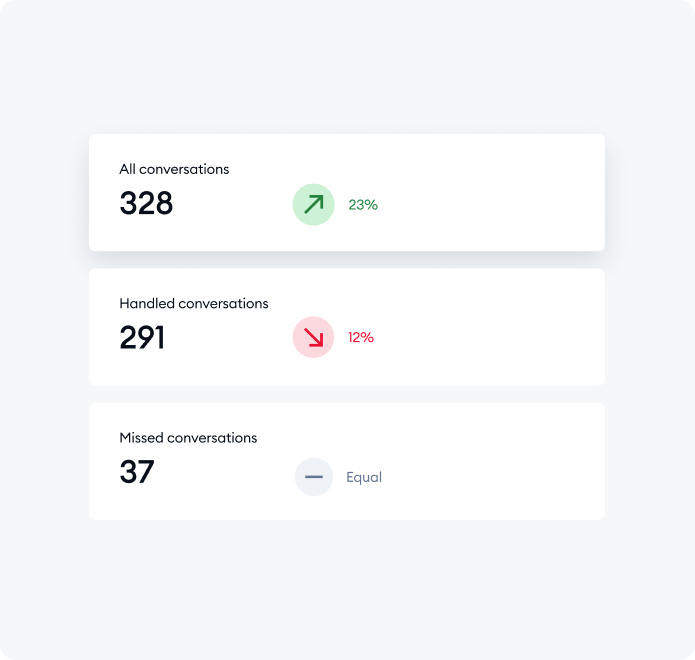
There are any number of experiences in the shopping world that modern consumers find eminently relatable when they see other people going through it: the self-checkout line telling you to remove nonexistent items from the bagging area; options to add a tip to an historically untipped service; screaming “REPRESENTATIVE!” after the automated phone system tells you the menu options have changed.
That last one has taken on a new twist with the advent of online AI chatbots handling incoming inquiries and support requests. AI was supposed to change the game for applications like this, but in practice it hasn’t really worked out to be any better than automated phone attendants. modern technology hasn’t made things easier, it’s only toned down our anguished screams and transformed them into a typewritten “i want to speak to an agent.”
Until now.
The creators of Tidio have come up with something that will actually change the game in supporting the customers of your ecommerce business. It does this using the latest AI craze: the language learning model. Just like ChatGPT, Gemini, and Bing, Tidio’s platform has its own AI assistant called Lyro. Lyro is trained using massive amounts of data, so that it can learn how to communicate in more realistic ways, understanding context and being able to “understand” what a customer needs from any given interaction. What makes Tidio work so well, though, is that you can further train it on your own products and knowledge base. Like an employee who is qualified for the job but still needs to learn how you do things internally, Tidio shows up on day one ready for action and competent. And then it gets better at its job the more it learns about your business.
This means Tidio is useful for more than just support requests: it can also take on some sales roles, too, able to offer incentives at the right time to convert a sale, collect data from clients, automate email marketing, and more. What’s even better about this AI tool is that it’s really just the cherry on top of a customer-support sundae. Tidio is a full-fledged support platform that offers standard features like ticketing, live chat with an actual representative, and an automated method of assigning these tickets to the right department, among other things. Tidio’s not going to solve all your customers’ problems, but it’ll make sure your employees aren’t needlessly spinning plates answering questions that don’t require human intelligence.
Pricing
If you were to look at Tidio’s client list, you might just assume that it’s financially out of your league. Can you really afford the same tool that’s used by Netflix, Patagonia, Uber, and Jaguar. Actually, yes. While the pricing is extremely reasonable, the pricing structure is much too fragmented and confusing. Features like the chatbots or email automation are offered as a separate subscription. The modularity of the pricing ensures that customers only pay for what they need, but the sheer volume of options is a lot to take in. And it requires a glossary. Within the Tidio platform, these phrases have specific meanings:
Live Chat — refers to realtime messaging between humans (not the chatbots or Lyro)
Handled Conversations — These are any chat, ticket, email, or social media conversation. A handled conversation generally means the solving of one issue for one customer.
Visitors Reached — some of the AI features can proactively reach out to customers (offering incentives, for example). Each of these automations can reach up to a maximum number of site visitors, depending on the plan.
Seats — like a per-user license, each “seat” on the platform can be occupied by one of your support agents
Customer Service Platform
Free, $0/month — 50 Handled Conversations, unlimited seats, live chat, ticketing, email management, live video calls, all available integrations, mobile and desktop apps, basic customization, custom sending domain and email signature, basic analytics, AI reply assistant, email support only (for you, not your customers)
Starter, $29/mo — 100 Handled Conversations, all of the above, plus: live visitors list, operating hours, 24x5 live chat support (for you, not your customers)
Growth, multi tiered pricing — The growth plan gets you everything in Starter, plus: the option to remove Tidio branding, advanced analytics, live typing, viewed page history, visitor info, visitor notes, automatics response, automatic chat assignment, automated satisfaction survey, automated conversation solving, canned responses, permissions, native Shopify actions. This plan’s pricing is tiered based on the number of Handled Conversations you want:
- $59/mo — up to 250
- $89/mo — 251 to 400
- $129/mo — 401 to 600
- $159/mo — 601 to 800
- $179/mo — 801 to 1,000
Lyro AI Assistant
Free, $0/mo — 50 free Lyro conversations (lifetime), all available integrations, FAQ upload, FAQ scraper, Website scraper, Lyro tasks, basic customization, personality customization, email support (for you)
Lyro AI, $39/mo — up to 200 conversations each month, all of the above, plus: option to remove Tidio branding, 24x5 live chat support (for you)
Chatbots
Free, $0/mo — 100 visitors reached, all available integrations, basic customization, no Tidio branding, custom branding, sales chatbot templates, FAQ chatbot templates, visual chatbot builder, email support (for you)
Chatbots, multi tiered pricing — All of the above, plus: 24x5 live chat support (for you). The Chatbot plan pricing is tiered based on the number of visitors reached:
- $29/mo — up to 2k visitors
- $39/mo — up to 3k visitors
- $49/mo — up to 5k visitors
- $69/mo — up to 10k visitors
- $85/mo — up to 15k visitors
- $99/mo — up to 20k visitors
- $119/mo — up to 30k visitors
- $139/mo — up to 40k visitors
Email Marketing
Free, $0/mo — 500 monthly emails, all available app integrations, custom sending domain, custom email signature, 500 templates, contact list segmentation, drag and drop email builder, email analytics, email support (for you)
Email marketing, multi tiered pricing — all of the above, plus: 24x5 live chat support. Email marketing plan is based on the number of emails sent:
- $10/mo — up to 2,500 emails
- $19/mo — up to 5,000 emails
- $39/mo — up to 10,000 emails
- $79/mo — up to 20,000 emails
Tidio+
Essentially a custom plan built using any or all of their features you want, starting at $499 per month.
The Details
At its heart, Tidio is a support/helpdesk platform with all the features you’d expect from something that competes with bigger names like Zendesk, or Zoho Desk, or Freshdesk, or AzureDesk. Not having put the word “desk” in its name, Tidio instead relies on innovative features and ease of use to appeal to potential customers. There are standard features like ticketing, automated assignment of those tickets to agents, and canned responses to common questions that your support team will appreciate. And then there are some nonstandard ones that improve the experience on both sides of the chat: seeing what the user is typing while they’re typing it for example, which gives the agent an idea of what the question is going to be and the time to start preparing an answer well before the user hits “send.” The AI Reply Assistant helps to create friendlier answers: sometimes all an agent really needs to say is “Yes,” but if that’s the only thing they type it comes across as curt and, for some, rude. Type “yes” and the AI will suggest a longer option, like “Yes, that is correct.” It’s a little detail that makes a big impact.
The live agent panel is also extremely well organized, arming your support team with all the info they need for each case. It acts as a multichannel inbox, providing a central location for all user information, an order summary, and chat history. Meanwhile, agents can easily see all open tickets they’re currently assigned to stay on top of their caseload.
Beyond the expected features, though, Tidio stands out because of its exceedingly clever use of AI and automations to make the support experience more efficient and effective for both agents and customers alike. Take the Chatbot automaton, for example. When you first log in, Tidio offers several templates for different types of bots—like an interactive FAQ or a data-collecting lead generator. With the former, customers can quickly click through categories, answer questions to further narrow the possibilities, and then receive an answer. If the bot has no answer, it can transfer you to an agent—and provide that agent with the full transcript of what’s already been said so they’re not starting from scratch.
While this kind of chatbot is nothing new, what’s going on behind the scenes in Tidio to facilitate the creation of the bots is so well done it deserves a call out. In most cases, you won’t need to do much more than customize one of the platform’s 35+ templates to deploy a bot on your site. These templates contain prebuilt workflows for common objectives: Did someone abandon a cart? There’s a bot for that. Want to upsell or just recommend products? There’s a bot for that. Want to incentivize someone to buy what they’ve already put in their cart? There’s a bot for that.
One really cool one integrates with your Instagram account: anytime someone reacts to one of your Stories, a bot can send an automated reply on your behalf—a really low-risk/high-reward way to build engagement and loyalty. On the off chance that you’ll need to build a chatbot from scratch, Tidio uses a visual, drag and drop format to build a workflow, just like you were writing up a flowchart.
Finally, there’s Tidio’s newest feature, which demonstrates one of the more practical uses for the Language Learning Model (LLM) that’s put artificial intelligence in the spotlight recently. Lyro is trained up in conversation and contextual understanding in much the same way as ChatGPT, etc. To set it up for your store, you also train it on your business. It scrapes your website, help files, knowledge base—everything and anything that contains information about your business, your products, and policies. This information needs to be digital and accessible by Lyro, of course—that printed catalog on your desk won’t get read.
Still, with this kind of training, Lyro can become the closest thing to a live support agent without actually being alive. Unlike a chatbot, which is programmatic and only works if your customers answer in predicted ways, Lyro can have an actual dialogue. And because it understands context, and the relationship between words and the things they represent in the real world, the questions don’t need to be asked in very precise ways. As a basic example, let’s say your FAQ says you ship only to North America and Europe without mentioning a specific country. A chatbot would not be able to answer “yes” to the question “Do you ship to Denmark?” Instead, your customer would see something like “I do not see Denmark listed in the FAQ.” Sale lost. Lyro, on the other hand, would know that Denmark is in Europe, and that you ship to Europe, and would answer correctly.
If you’re concerned about the safety of this scenario, Tidio’s done a good job of building protections into Lyro to avoid getting into dicey situations. It will never answer legal, medical, or financial questions. You wouldn’t trust any but the most qualified people and their natural intelligence with these kinds of inquiries and AI is no different. Also, when Lyro doesn’t know the answer to something, it actually says it doesn’t know the answer. This isn’t the case with ChatGPT, which has a problem with just making things up when no answer is readily available. These safety features ensure that Lyro’s only contributions will be assistance and efficiency—not liability.
Across all these features, Tidio offers extensive analytics measuring your support team’s impact.
Integrations
As an ecommerce tool, you’d expect Tidio to integrate with a number of different ecomm platforms. And you’d be right. It easily connects with all the most widely used ones. Think: Shopify, Magento, Squarespace, Wix, and Commerces, both Big and Woo. It also connects with quite a few platforms that you probably haven’t heard of. What even is a Jimdo?
It also offers a number of other integrations with other tools to help you grow your ecomm business. If you don’t use Tidio’s email marketing, you can connect with other tools for this, like Mailchimp, Klaviyo, and more. Integrations with Whatsapp, Instagram, and Messenger ensure that you won’t miss any DMs or reactions from your followers. CRM integrations—Salesforce, Agile—make it easy to grab the info you get from support conversations.
Conclusion
Tidio is one of the most impressive ecommerce tools we’ve reviewed, and certainly feels like its heralding a new direction for customer support. Automated phone menus, email systems, and chatbots have all offered differing levels of frontline support. All three have fallen short in some form or another because there’s only so much you can automate. Or, at least, there was.
Tidio shows that even with the more programmatic chatbot, you can handle many of the most common issues without ever involving a human. And when a human is needed, that chatbot did the gruntwork of getting all the basic information, freeing your agents up to focus on real problem solving. With Lyro, it goes many steps further, handling more complex problems with an ease a chatbot couldn’t comprehend (because chatbots don’t comprehend anything).
But the best thing about Tidio is, despite all this reliance on automation, it doesn’t undervalue the only support tool that can handle all situations: a real, live person. The bots, AI, and automations aren’t built to replace your staff, they’re built to help them. This, in turn, makes it easier for your staff to help your customers, and that’s what’s really important here.
-
Features
-
Ease of Use
-
Reporting
-
Integrations

